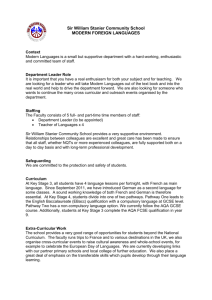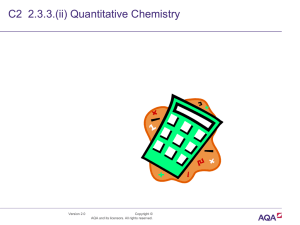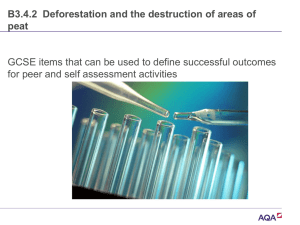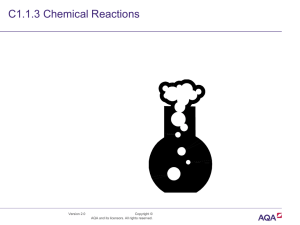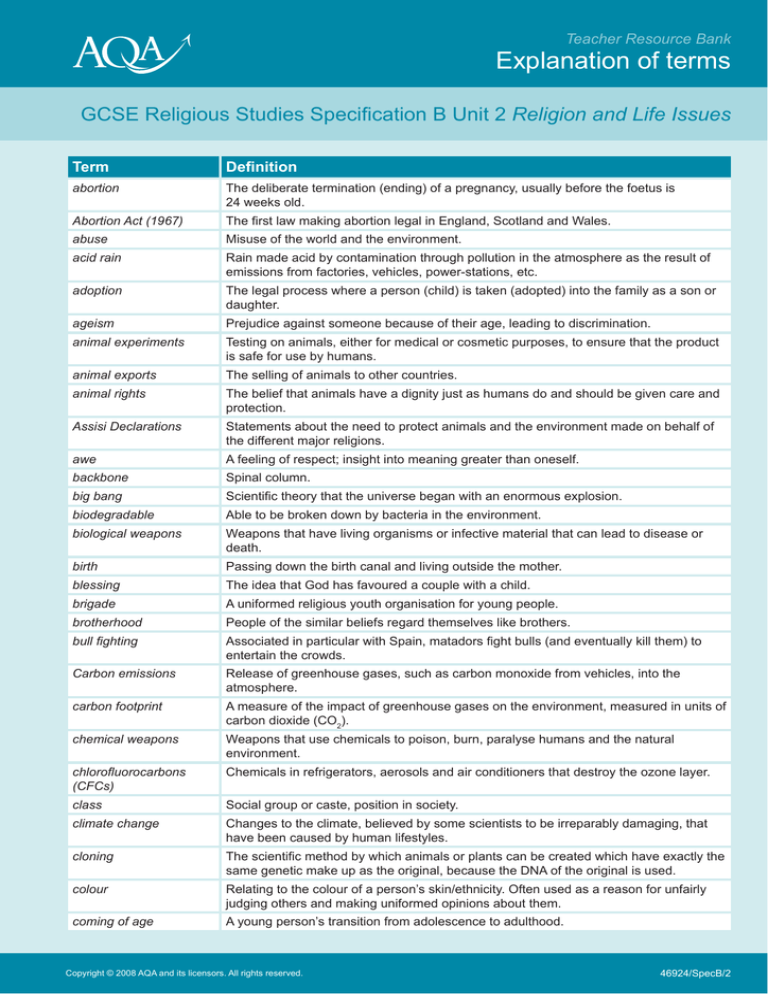
Teacher Resource Bank
Explanation of terms
GCSE Religious Studies Specification B Unit 2 Religion and Life Issues
Term
Definition
abortion
The deliberate termination (ending) of a pregnancy, usually before the foetus is
24 weeks old.
Abortion Act (1967)
The first law making abortion legal in England, Scotland and Wales.
abuse
Misuse of the world and the environment.
acid rain
Rain made acid by contamination through pollution in the atmosphere as the result of
emissions from factories, vehicles, power-stations, etc.
adoption
The legal process where a person (child) is taken (adopted) into the family as a son or
daughter.
ageism
Prejudice against someone because of their age, leading to discrimination.
animal experiments
Testing on animals, either for medical or cosmetic purposes, to ensure that the product
is safe for use by humans.
animal exports
The selling of animals to other countries.
animal rights
The belief that animals have a dignity just as humans do and should be given care and
protection.
Assisi Declarations
Statements about the need to protect animals and the environment made on behalf of
the different major religions.
awe
A feeling of respect; insight into meaning greater than oneself.
backbone
Spinal column.
big bang
Scientific theory that the universe began with an enormous explosion.
biodegradable
Able to be broken down by bacteria in the environment.
biological weapons
Weapons that have living organisms or infective material that can lead to disease or
death.
birth
Passing down the birth canal and living outside the mother.
blessing
The idea that God has favoured a couple with a child.
brigade
A uniformed religious youth organisation for young people.
brotherhood
People of the similar beliefs regard themselves like brothers.
bull fighting
Associated in particular with Spain, matadors fight bulls (and eventually kill them) to
entertain the crowds.
Carbon emissions
Release of greenhouse gases, such as carbon monoxide from vehicles, into the
atmosphere.
carbon footprint
A measure of the impact of greenhouse gases on the environment, measured in units of
carbon dioxide (CO2).
chemical weapons
Weapons that use chemicals to poison, burn, paralyse humans and the natural
environment.
chlorofluorocarbons
(CFCs)
Chemicals in refrigerators, aerosols and air conditioners that destroy the ozone layer.
class
Social group or caste, position in society.
climate change
Changes to the climate, believed by some scientists to be irreparably damaging, that
have been caused by human lifestyles.
cloning
The scientific method by which animals or plants can be created which have exactly the
same genetic make up as the original, because the DNA of the original is used.
colour
Relating to the colour of a person’s skin/ethnicity. Often used as a reason for unfairly
judging others and making uniformed opinions about them.
coming of age
A young person’s transition from adolescence to adulthood.
Copyright © 2008 AQA and its licensors. All rights reserved.
46924/SpecB/2
Teacher Resource Bank
Explanation of terms
GCSE Religious Studies Specification B Unit 2 Religion and Life Issues
Term
Definition
commitment
A pledge, promise or affirmation of agreement.
compassion
A feeling of sympathy that makes one want to help.
conception
The moment the sperm fertilises the egg.
confirmation
A sacrament admitting a baptized person to full participation in the church.
conflict
Fighting, a state of discord or war.
conscience
The inner feeling that you are doing right or wrong.
conscientious objectors
People who object to fighting in a war because killing is against their conscience.
conservation
Looking after the environment and protecting animals.
conventional weapons
Weapons that do not contain biological, chemical or nuclear elements.
creation
Belief that God created the universe and everything in it.
deforestation
The cutting down of large amounts of forest, usually because of business needs.
design
The argument that God designed (made) the Universe because everything is so
intricately made in its detail that it could not have happened by chance.
destruction of crops
Food crops destroyed by weather conditions.
deterrent
A way of discouraging an enemy attack by being able to retaliate.
disability
When a person has a mental or physical condition that limits movement or activities.
disarmament
When a country gets rid of its weapons.
discrimination
To act against someone on the basis of sex, race, religion, etc. Discrimination is usually
seen as wrong.
DNA
Deoxyribonucleic acid that carries genetic information in a cell.
droughts
Long periods of abnormally low rainfall.
duty
A moral or legal obligation – an action that must be done.
earth summits
Meetings of international leaders aimed at reaching an agreement that will reduce
environmental pollution and climate change.
embryo
Fertilised ovum at about 12 –14 days when implanted into the wall of the womb.
emissions
A substance discharged into the air.
empowerment
An individual having the right to make their own choices and act on them.
ensouled
Receives a soul.
equality
That people should be given the same rights and opportunities regardless of sex,
religion, race, etc.
evolution (evolved)
Theory that says living things change gradually over a long time.
experience
Something that happens to a person.
extinction
When all members of a species have died out and that species will never exist on Earth
again.
factory farming
When animals are used for meat or dairy products, but are kept indoors in very small
spaces.
faith schools
Schools run by a particular religion rather than by the state.
famine
Starvation owing to drastic, far-reaching food shortage.
fertility
Being able to conceive a child.
foetus
Fertilised ovum from eight weeks.
fossil fuels
A hydrocarbon used as a fuel, like natural gas, petroleum, and coal.
46924/SpecB/2
Copyright © 2008 AQA and its licensors. All rights reserved.
Teacher Resource Bank
Explanation of terms
GCSE Religious Studies Specification B Unit 2 Religion and Life Issues
Term
Definition
fostering
The taking of a child from a different family into a family home and bringing them up
with the rest of the new family.
freedom of choice
Being able to choose to do whatever you want.
gender
Another word for a person’s sex, ie male, female.
generation gap
A difference between the views of young people and their parents.
genetic modification
Plants and animals that have had their natural make-up altered by scientists.
Geneva Conventions
Rules about war and the treatment of prisoners and civilians.
gift
The idea that a child is God’s gift to humans.
global warming
The scientific concept that the world is getting warmer.
greenhouse effect
The trapping of heat from the sun in the lower atmosphere due to an increase in carbon
dioxide, methane and other pollutants.
groups
People joining together.
handicap
A physical or mental disability.
harmony
Living in peace with others.
holy war
Fighting for a religious cause or God probably controlled by a religious leader.
Human Fertilisation and
Embryology Act (1990)
The amendment to the Abortion Act 1967 that reduced time limit to 24 weeks.
hunting
The chasing of animals to kill them, which may be done for food, protection or human
pleasure.
individuals
Persons acting on their own.
influence of parents
How values and opinions are passed to children.
influence of the media
Newspapers, television, films can reinforce or break down stereotypes.
initiation
Being entered formally into a religion.
international action
Action taken by groups of countries to help conserve the environment.
Just War
A war that the Christian Church defines as acceptable: this must fit certain criteria. The
idea was developed by St Thomas Aquinas and the Roman Catholic Church.
justice
Bringing about what is right, fair, according to the law or making up for a wrong that has
been committed.
law
Rules in a country that govern how people live.
lifestyle
The way people live that reflects their values and attitudes.
marginalisation
The social process of becoming or being isolated and left out.
media
The organisations which convey information to the public, especially television and the
printed press.
miracle of life
The idea that life is wonderful, amazing or special.
moral codes
Moral rules by which a person decides to live.
NATO
North Atlantic Treaty Organisation, an alliance formed to prevent war in Europe.
natural disasters
Disasters caused by nature, eg earthquakes, volcanoes.
natural habitats
The places where species of plants or animals live in the wild.
natural resources
Resources that are part of the environment, eg water, minerals, and which are used
and often abused by humans.
non-biodegradable
Not able to be broken down by the environment.
nuclear proliferation
The increase in the number of states that have the potential to use nuclear weapons.
Copyright © 2008 AQA and its licensors. All rights reserved.
46924/SpecB/2
Teacher Resource Bank
Explanation of terms
GCSE Religious Studies Specification B Unit 2 Religion and Life Issues
Term
Definition
nuclear weapons
Weapons that work by a nuclear reaction that devastate huge areas and kill large
numbers of people.
Ohito Declaration
A statement of religious concern for the protection of the environment.
oil spills
Leaking of oil into the environment, usually the sea.
origins of life
How life began.
ozone layer
A layer of ozone in the upper atmosphere that absorbs most of the Sun’s radiation; it is
being destroyed by CFCs.
pacifism
The belief of people who refuse to take part in war and any other form of violence.
peace
An absence of war and conflict, which leads to happiness and harmony.
peace keeping force
Troops sent by a group of countries to act as a buffer between warring parties, or to
keep the peace after hostilities cease.
peer pressure
Influence exerted by friends on each other.
pesticides
Substances (poison) used to destroy insects and pests that attack crops.
pollution
The contamination of something, especially the environment.
positive discrimination
Treating people more favourably because they have been discriminated against in the
past.
poverty
Condition of being without money, food and other basic needs of life (being poor).
prejudice
Unfairly judging someone before the facts are known. Holding biased opinions about
an individual or group.
preservation
Look after the environment and life in order to keep it safe.
pressure groups
Collections of people outside government who campaign for changes in society.
Pro-choice
Slogan used for the view that women should have the right to choose whether or not to
have an abortion.
Pro-life
Slogan used for the view that supports the right to life of the foetus.
proliferation
Spreading to other countries and getting more numerous.
Purpose of life
The goal of life and the reason for living.
Quakers
Members of the Society of Friends, a Christian denomination.
quality of Life
A measure of fulfilment.
race
A group of people with the same ethnic background.
racism
Showing prejudice against someone because of their ethnic group or nationality.
recycling
Reusing old products to make new ones.
Red Crescent
A branch of the Red Cross in a Muslim country.
Red Cross
A humanitarian agency that helps people suffering from war or other disasters.
refugees
People who flee from their homes seeking safety elsewhere.
relationships
A relationship is an association among two or more people.
religion
A set of beliefs, values and practices usually based on the teaching of a spiritual leader.
religious prejudice
Prejudice based on religion or beliefs.
responsibility
The legal or moral duty which a person has and as a result may be blamed for it if it is
not carried out.
rights
The legal or moral entitlements to do or not to do something.
sacred
Holy, precious because given by God.
sanctity of life
Life is sacred because it is God-given.
46924/SpecB/2
Copyright © 2008 AQA and its licensors. All rights reserved.
Teacher Resource Bank
Explanation of terms
GCSE Religious Studies Specification B Unit 2 Religion and Life Issues
Term
Definition
scapegoating
Blaming certain groups for problems in society.
secular
Not religious.
severe weather
Extreme weather events such as hurricanes, tornadoes, etc.
sexism
Prejudice and discrimination based on a person’s gender (usually a woman).
society
A grouping of people in a country.
spirituality
A sense of something which is outside normal human experience.
stereotyping
Having an over-simplified mental image of people and applying it to everyone in a
group.
stewardship
The idea that believers have a duty to look after the environment on behalf of God.
suffering
Pain or distress.
sustainable development Development which takes into consideration the impact on the natural world for future
generations.
terrorism
When groups use violence, or the threat of violence, to achieve their aims, rather than
using a democratic process. The violence is often indiscriminate and intended to create
an atmosphere of fear.
throwaway society
A term referring to the wastefulness.
tolerance
Respecting the beliefs and practices of others.
toxic chemicals
Poisonous chemicals.
United Nations (UN)
An organisation set up at the end of World War II to prevent war and encourage peace
by discussing problems between countries.
unwanted children
Unplanned pregnancies.
upbringing
A person’s rearing and education during childhood.
value of the individual
The importance of every human being.
vegan
A person who will not use any animal product.
vegetarianism
The belief held by people that do not eat meat.
viable
The point at which a foetus could survive if it were to be born.
victims of prejudice
People who have experienced prejudice or discrimination against themselves.
victims of war
People who are harmed or suffer as a result of war.
vivisection
The cutting up of animals for scientific experiments.
‘War on Terror’
Action taken after 9/11 to tighten security, prevent future attacks and destroy terrorist
organisations.
weapons of mass
destruction (WMD)
Weapons that can kill large number of people and/or cause great damage.
wonder
Marvelling at the complexity and beauty of the universe.
worship
Ceremony or prayers showing love and devotion to a deity, an idol or sacred object.
zoos
Places in which wild animals are kept to display to the public.
Copyright © 2008 AQA and its licensors. All rights reserved.
46924/SpecB/2
Teacher Resource Bank
Explanation of terms
GCSE Religious Studies Specification B Unit 2 Religion and Life Issues
Buddhism
Term
Definition
anatta
No self, no soul; the Universal Truth that the soul is insubstantial; that people change
over their lives; denial of a real or permanent self.
anicca (anitya)
Impermanence, instability, not permanent, etc.
Buddha
1. Historically the Buddha – the enlightened one.
2. An awakened or enlightened person.
dhamma (dharma)
Universal law; ultimate truth; the teachings of Buddha.
Dhammapada
A scripture of the Pali Canon with 426 verses.
dukkha
Suffering, imperfection, illness; also means dissatisfaction. Suffering; ill; everything
leads to suffering; unsatisfactoriness.
the Eightfold Path
The way to wisdom and mental training and the way of morality.
the Five Moral Precepts
To not kill any living being, refrain from stealing, refrain from wrongful sexual activity,
refrain from lying, refrain from taking drugs and alcohol that cloud the mind.
The Four Noble Truths
Dukkha, Samudaya, Nirodha, Magga (suffering, the cause of suffering, the end of
suffering, the path to the end of suffering).
kamma (karma)
Literally ‘action’. Deliberate actions that affect the believer’s circumstances in this and
future lives; cause and effect.
magga (marga)
Path. ‘The Middle Way’ which leads to freedom from suffering (The Fourth Noble Truth).
mantras
Prayers/chants such as Om Mani Oadme Hun.
metta
Loving kindness. A pure love, which is not possessive and which does not seek to gain.
nibbana (nirvana)
To reach a state of perfect peace where the individual experiences liberation from the
cycle of birth, death and rebirth.
niroda (nirodha)
The end of suffering is to get rid of desire and craving (the Third Noble Truth).
samatha
Meditation; a state of calmness.
samsara
The circle of births, death and re-birth, which can be transcended by following the
Eightfold Path.
Sangha
The community or assembly, of monks, nuns, lay men and lay women, depending on
the form of Buddhism practised.
Siddattha Gotama
The name of the historical Buddha.
sutta (sutra)
The word of the Buddha.
tanha (trishna)
Desire, which causes suffering. The attempt to grasp at the things we enjoy.
the Three Marks of
Existence
Anicca, Anatta, Dukkha.
the Three Refuges
Buddha, Dhamma, Sangha.
Tipitaka
A collection of texts, the Vinaya, Sutta and Abhidamma. Literally means Three Baskets
or Pali Canon.
vinaya
The rules of discipline of Buddhist monastic life.
vipassana (vipashyana)
Insight into the nature of things; meditation.
46924/SpecB/2
Copyright © 2008 AQA and its licensors. All rights reserved.
Teacher Resource Bank
Explanation of terms
GCSE Religious Studies Specification B Unit 2 Religion and Life Issues
Christianity
Term
Definition
Bible
Sacred book for Christians containing both the Old and New Testaments.
Confirmation
The sacrament in which the faith of the believer is ‘confirmed’ or strengthened by the
Holy Spirit. Those being confirmed personally confirm their acceptance of the promises
made by others at their baptism. Different dioceses celebrate confirmation at different
ages.
creator
God is the creator of the earth and of life.
eternal life
Everlasting life after death.
guide
Christians believe that the Holy Spirit guides them in their lives so that they can do what
is right.
Holy Spirit
The third person of the Holy Trinity who descended like a dove on Jesus at his baptism.
Christians believe that the Holy Spirit is present and inspires them.
Jesus
1st century Jewish teacher and holy man, believed by Christians to be the Son of God.
monotheism
Belief in one God.
Resurrection
When Jesus rose from the dead on Easter Day. An event recorded in all four gospels
and the central belief of Christianity.
salvation
Saving the soul, deliverance from sin and admission to heaven brought about by the
life, death and resurrection of Jesus.
sustainer
God sustains the Universe and ensures that it continues.
Trinity
The belief that there are three persons in the One God. The Father, Son and Holy Spirit
are separate, but are also one being.
Copyright © 2008 AQA and its licensors. All rights reserved.
46924/SpecB/2
Teacher Resource Bank
Explanation of terms
GCSE Religious Studies Specification B Unit 2 Religion and Life Issues
Hinduism
Term
Definition
ahimsa (ahinsa)
Not killing. Respect for life, not being violent.
atman (atma)
Self. Can refer to the body, mind or soul depending on context. Usually the inner, or
real, self.
Bhagavad Gita
The Song of the Lord, sung by Krishna and part of the Mahabharata. Considered an
Upanishad. Most famous and popular Hindu scripture.
Brahma
Hindu deity responsible for creative power.
Brahman
The ultimate reality from which everything comes and into which everything will return.
dharma
Religion. The right conduct and laws which uphold order and harmony in society.
Four Aims of Life
Dharma, Artha, Karma, Moksha.
karma
Action. The law of cause and effect.
mandir
A Hindu temple.
mantra
A short prayer/chant repeated as an aid to meditation.
moksha (moksa)
Final freedom from the cycle of life and death.
murti
Image or deity used as a focus of worship and offerings.
puja
1. Paying respect to a deity as an honoured guest.
2. Ways to worship in the home or temple.
reincarnation
Being reborn again in another form.
samsara (sansara)
The world, where the cycle of birth, death and rebirth takes place.
triad of Gods
Brahma, Vishnu, Shiva – also known as the Trimurti. They represent and control the
three functions of creation, preservation and destruction.
yoga
1. A union of the soul with the deity and the process taken to reach this.
2. A form of self-discipline and meditation.
46924/SpecB/2
Copyright © 2008 AQA and its licensors. All rights reserved.
Teacher Resource Bank
Explanation of terms
GCSE Religious Studies Specification B Unit 2 Religion and Life Issues
Islam
Term
Definition
akhirah
Everlasting life after death.
Allah
The Islamic name for God.
Five Pillars of Islam
Shahadah, Salah, Sawm, Zakah and Hajj.
Hadith
Words and actions of the Prophet Muhammad. A major source of Islamic Law.
Iblis (Ibis)
The tempter – also known as Shaytan.
Jahannam
Muslim word for hell.
Khalifa(h)
Stewardship. The idea that believers have a duty to look after the environment on
behalf of God.
Makkah (Mecca)
The city where Muhammad was born. The spiritual centre of Islam. It is in Saudi Arabia.
monotheism
Belief in one God.
Muhammad
The last and greatest of the prophets of Allah.
Muslim
One who has submitted to the will of Allah and has accepted Islam.
Qur’an
The Holy Book revealed to the Prophet Muhammad by the angel Jibril. Allah’s final
revelation to humankind.
salah (salat)
Prayer with and worship of Allah, performed under the conditions set by the Prophet
Muhammad – five times a day. The second pillar of Islam.
sawm
Fasting from dawn to dusk during Ramadan; sex and smoking are banned when the
believer is engaged in this. The fourth pillar of Islam.
shahadah
Muslim declaration of faith. The first pillar of Islam.
Shari’ah
Islamic law based directly upon the Qur’an and the Sunnah.
surah
A division (chapter) of the Qur’an. There are 114 in all.
tawhid
The oneness and unity of Allah.
ummah
All Muslims are regarded as part of a brotherhood; the nation of Islam.
zakah (zakat)
1. Purification of wealth by giving to the poor.
2. An act of obligatory worship for Muslims.
Copyright © 2008 AQA and its licensors. All rights reserved.
46924/SpecB/2
Teacher Resource Bank
Explanation of terms
GCSE Religious Studies Specification B Unit 2 Religion and Life Issues
Judaism
Term
Definition
Bar Mitzvah
Celebration of a boy coming of age at 13. Literally “Son of the Commandment”.
Bat Mitzvah
Celebration of a girl coming of age at 12, in reform synagogues. Literally “Daughter of
Commandment”.
the Covenant
God’s agreement to look after the Jews as his chosen people, subject to Israel’s
obedience.
creator
God is the creator of the earth and of life.
kashrut
Laws relating to having a Kosher lifestyle, eg keeping the food laws.
kosher
Foods which meet the Jewish laws.
monotheism
Belief in one God.
redeemer
One who redeems and saves from the consequences of sin. Often used to describe
God.
repentance
Saying sorry and trying to change ones behaviour so as to not do the same again.
sustainer
God sustains the Universe and ensures that it continues.
synagogue
Jewish place of worship.
Tenakh (Tanakh)
The 24 books of the Jewish Bible. Jewish scriptures – Torah (Law), Neviim (Writings)
and Ketuvim (Prophets).
Torah
1. The five books of Moses and first section of the Tenakh – the law.
2. The whole of Jewish teaching.
trefah
Forbidden food – means ‘torn’.
46924/SpecB/2
Copyright © 2008 AQA and its licensors. All rights reserved.
Teacher Resource Bank
Explanation of terms
GCSE Religious Studies Specification B Unit 2 Religion and Life Issues
Sikhism
Term
Definition
5Ks
Symbols of Sikhism: Kachera, Kangha, Kara, Kesh, Kirpan. Not all Sikhs interpret these
symbols in exactly the same way.
granthi
A reader and explainer of the Guru Granth Sahib and a person who officiates at
ceremonies.
gurdwara
The Sikh place of worship. ‘Literally’ the doorway to the Gurus.
Guru Granth Sahib
Collection of Sikh scriptures, collated by Guru Arjan and Guru Gobind Singh.
Ikonkar
Belief that ‘God is One’ – from the Mool Mantar.
kachera
The traditional underwear or shorts, symbolising moral purity. One of the 5Ks.
kangha (kanga)
A comb that is worn in the hair, symbolising self-discipline. One of the 5Ks.
kara
A steel band that is worn on the right wrist, symbolising the oneness of God and Khalsa.
One of the 5Ks.
kesh
Uncut hair, symbolising the fight for spiritual justice. One of the 5Ks.
khalsa
The Sikh community founded by Guru Gobind Singh in 1699 C.E. Literally ‘the
community of the poor’.
kirpan
A sword, symbolising the fight for spiritual justice. One of the 5Ks.
kurahit
Things which are not allowed – prohibitions.
langar
The dining hall of the gurdwara and the food served there. Literally ‘Guru’s’ kitchen.
monotheism
Belief in one God.
Mool Mantar (Mul
Mantra)
The statement of belief set out at the beginning of the Guru Granth Sahib.
Rehat (Reht) Maryada
The Sikh code of discipline covering religious rites and ethical observances.
sewa
Selfless service for the Sikh community and gurdwara, also directed at all of humanity.
Often refers to voluntary work or work offered to God.
The Ten Gurus
The ten human Gurus, who were messengers of God.
Waheguru
‘Wonderful Lord’; a name for God.
Copyright © 2008 AQA and its licensors. All rights reserved.
46924/SpecB/2
Teacher Resource Bank
Explanation of terms
GCSE Religious Studies Specification B Unit 2 Religion and Life Issues
Notes:
Copyright © 2008 AQA and its licensors. All rights reserved.
The Assessment and Qualifications Alliance (AQA) is a company limited by guarantee registered in England and Wales (company number
3644723) and a registered charity (registered charity number 1073334). Registered address: AQA, Devas Street, Manchester M15 6EX.
Dr Michael Cresswell, Director General.
46924/SpecB/2
aqa.org.uk

